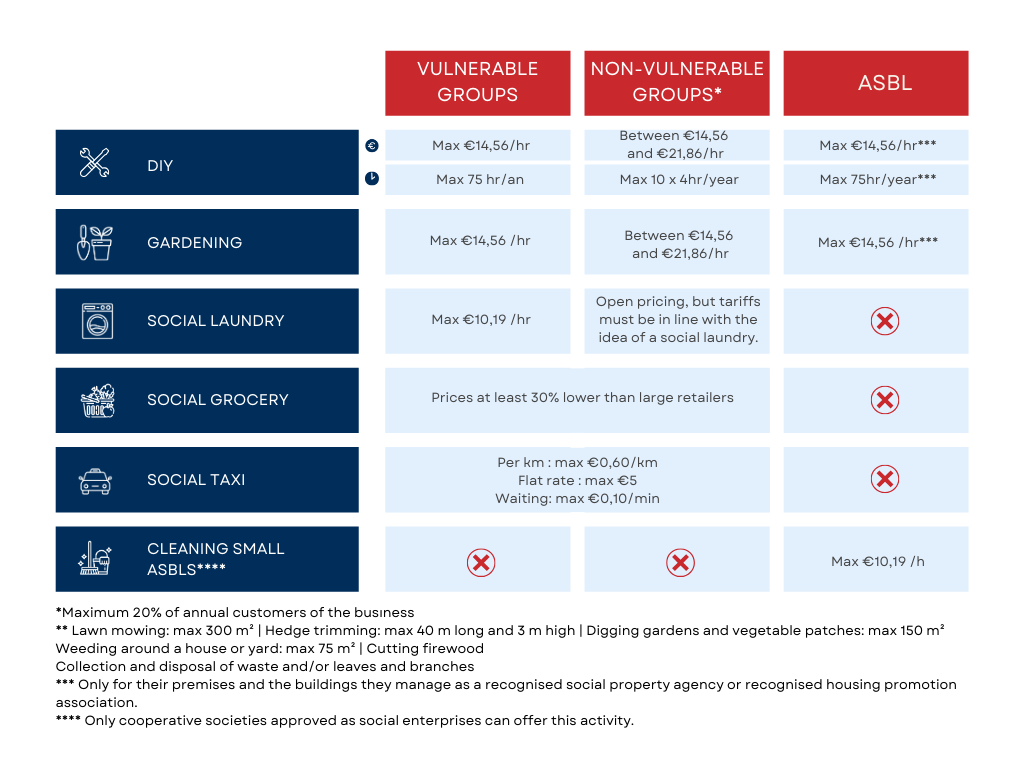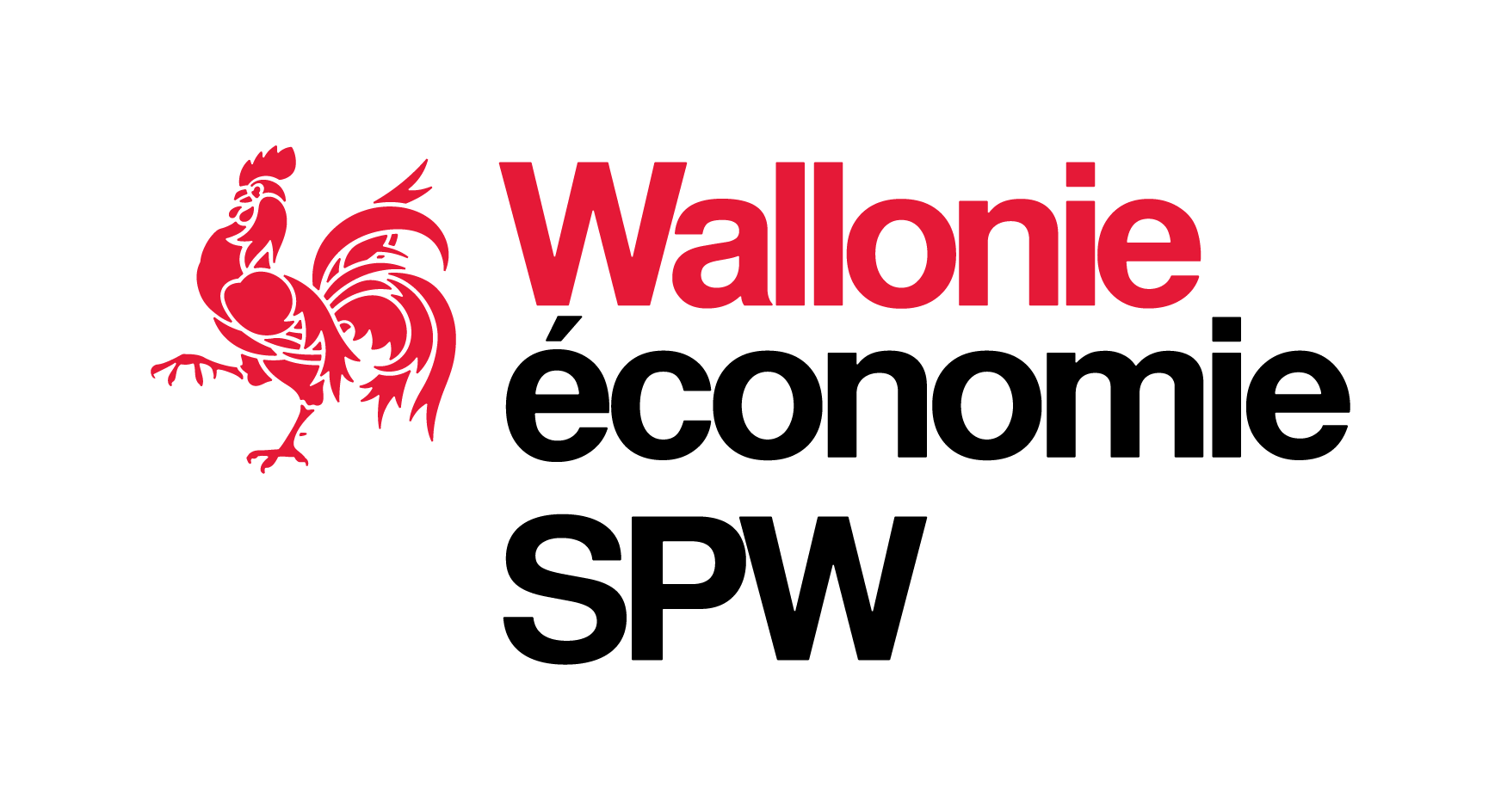IDESS
Are you a SCES, an ASBL, a public centre for social welfare or a group of public centres for social welfare? Would you like to offer informal care to your customers or beneficiaries? If so, apply for IDESS recognition. This recognition will give you access to grants and other support measures.

- The IDESS scheme is under a moratorium until 31 December 2026. During this period, no new applications for approval or for an increase in full-time equivalents (FTEs) can be submitted. Structures that are already approved will continue to benefit from their current subsidies. Renewals of approval remain possible, but without any increase in the number of subsidised FTEs. The situation will be reassessed from 2027 onwards.
What is an IDESS?
An IDESS (Employment development initiative in the informal care for social purposes sector) is a structure that offers informal care, mainly to the underprivileged.
Their objective is to meet needs that are too small to interest conventional companies.Would you like to use the services of an IDESS? Read the dedicated page to discover the list of IDESS in Wallonia, the services they offer and the access conditions.
What kind of work does an IDESS do?
Small maintenance, repair and home development work
The following is a non-exhaustive list of authorised and unauthorised minor maintenance, repair and development work:
Authorised activities Unauthorised activities Joinery
- Repairing or reattaching a detached handrail
- Repairing a stair tread
- Replacing part of the floor
- Repairing a door bottom
- Planing a door that sticks
- Repairing an undercarriage
- Planing a jammed frame
- Repairing a jammed shutter
- Repairing baseboards
- Installing a new staircase (even a miller's ladder)
- Laying a new floor
- Replacing a door bottom
- Replacing an undercarriage
- Installing a new shutter
Electricity
- Replacing a bulb
- Replacing a switch
- Adding a socket
- Replacing fuses
- Hanging a chandelier or sconce
- Repairing a doorbell or entry phone
- Placing a new installation in a room
- Recessing part of the electrical installation
- Installing an entry phone
Toilets
- Replacing a seal or valve head
- Replacing a tap
- Replacing a siphon
- Descaling taps
- Re-fixing a toilet or toilet board
- Unclogging a sink, washbasin, shower or toilet
- Repairing seals
- Bleeding radiators
- Replacing water supply and drainage systems
- Descaling a water heater
- Installing a new shower or bathtub
- Maintaining a boiler
Kitchen
- Installing an appliance
- Connecting to a drain
- Repairing a hood
Finishes
- Gluing or replacing a wallpaper strip
- Repairing paint work
- Painting a door, frame, wall, skirting board or piece of furniture
- Replacing a piece of fixed carpet or vinyl
- Replacing a small area of damaged ceiling
- Replacing a few broken or revealed tiles
- Installing curtains and picture frames
- Redecorating or repainting an entire room
- Repairing the chassis of an entire room
- Placing, sanding and oiling a floor
- Replacing fixed carpet or vinyl in an entire room
- Levelling off an entire room
- Tiling an entire wall
Insulation
- Insulating pipes
- Caulking a window
- Insulating an entire room or attic
Outdoors
- Cleaning a courtyard or paving with a pressure washer
- Using an anti-moss product
- Recementing a damaged exterior wall base
- Strengthening a garden shed
- Installing bird shelters
- Placing wire mesh or bird nets
- Paving an entire courtyard
- Building or installing a garden shed
Roofing
- Cleaning a cornice
- Replacing a cornice
- Replacing or repairing a roof or frame
- Installing a Velux window or skylight
Other
- Fixing shelves
- Assembling or disassembling furniture
- Moving furniture inside the house
- Programming an electronic device
- Sweeping a chimney
Exceptions for disaster areas
Following the floods in Wallonia in 2021, the federations InitiativES, Fédération des CPAS and Concertes called for IDESS to be allowed to provide more help in disaster areas. The idea is for recognised IDESSs to fully support disaster victims by carrying out the necessary work after disasters such as floods.
For disaster areas, the scope of small-scale work is extended to a whole room, or even a whole floor if it is entirely affected. Your priority is to work in the living areas most affected by the disaster.
Services remain limited in hours:- for the general public: 10 services of 4 hours maximum, per year and per customer;
- for vulnerable groups: 75 hours of service maximum, per year and per customer.
Conditions of application for the exception:
Who can carry out the work?
Only IDESS recognised for "DIY" activities can carry out this work, even if they are not located in the disaster areas.
Where can the work take place?
Work can only be carried out in disaster areas. The customer may own or rent the premises.
How to prove that you have suffered a loss
The customer must prove that they have suffered a loss through a certificate or other proof (provided by the municipality, insurance company, etc.).
If the customer lives in a municipality that has been declared a disaster area with specific disaster zones, they must live in one of these zones to benefit from this more extensive work.
Deadline for completion:
Work can be carried out within two years of the disaster. This rule applies as soon as the Walloon Region recognises a disaster area (e.g. for the floods in July 2021, work could be carried out until July 2023).
Compliance with other obligations:
IDESS must comply with all other legal obligations relating to their activity.
The development and maintenance of green spaces
- mowing the lawn,
- trimming a hedge,
- weeding around homes, yards and pavements,
- digging a garden or vegetable patch,
- cutting firewood,
- collecting and disposing of rubbish, leaves and branches,
- cleaning one or more graves,
- clearing snow from pavements.
Social transport
Transporting people who are disadvantaged by their financial situation, age, lack of mobility or geographical location for a variety of everyday occasions such as:
- shopping,
- taking part in a get-together,
- going to an administrative appointment,
- looking for a job,
- training,
- etc.
Social laundry
Providing low-cost washing machines and detergents.
Social shops
Selling food products and basic necessities at a lower price than large retailers.
This service is intended for people in vulnerable situations.
Cleaning premises (for small ASBLs)
Cleaning the offices and infrastructure of small ASBLs.
What are the rates and limits applied to the services offered by IDESS?
The rates and limits of the services offered by IDESS depend on the type of service and the status of the beneficiary. Service limitations may include, for example, restrictions on the surface area of green spaces to be maintained or the maximum number of annual hours allocated to each type of service.

What does IDESS recognition entitle you to?
Recognition as an IDESS allows you to apply for grants. Grant applications are made at the same time as recognition applications, renewals or any modification to this recognition.
Find out more
Browse the "benefits" tab of the process
How long is the recognition valid for?
IDESS recognition is valid for two years, renewable for four-year periods.
Your application for renewal of recognition must be submitted between eight months (240 days) and four months (120 days) before the expiry of the current recognition.Who is it for? How? Read about the details
- Apply for, renew or modify your IDESS recognition and related grants
- Request your "social economy" certificate as an employer (Art. 60 §7 with increased subsidies)
- Request your SINE employer certificate to benefit from SINE advantages when hiring
Useful documents
Inspection: are you compliant ?
Inspections can be carried out at any time in the field. Their aim is to check compliance with current regulations, licensing requirements and the conditions for granting any financial aid provided by the Walloon Region and/or co-financed by European funds. These inspections aim to encourage compliance with the rules and sanction irregularities, fraud and certain forms of operation.
Inspections can be triggered in a number of situations: on the initiative of the authorities, following a complaint or report, or at the request of the Labour Prosecutor the King's Public Prosecutor.
The inspectors in charge of inspections have several powers, including conducting investigations, drawing up Pro Justitia, entering workplaces or, with authorisation, inhabited areas, checking identities, searching for, examining and copying data media, making image-based observations, conducting hearings, and seizing and sealing goods.
They can carry out these inspections unannounced, or announce them in advance. It is therefore important to always be ready to ensure that an inspection can run smoothly.
Legal framework: The work of the Inspection Services is governed by the Decree on Economic, Employment and Research Inspection, and the Decree on Vocational Training and Retraining.
How to prepare for an inspection ?
You can be inspected at any time, whether announced or unannounced. To be ready for an inspection with peace of mind, it is essential that you comply with the legislation governing your business.
The best course of action, even before an inspection is carried out, is to keep the documents proving compliance with the regulations governing your activities (licences, cards, certifications, etc.) close at hand. Inspections are based on tangible evidence, not mere declarations. It is therefore important to provide the inspector with all the documents and information requested, in full transparency.
Collaboration is essential for effective, constructive inspections. Welcome the inspector and provide give them the help they need to accomplish their mission.
What to do after the inspection ?
If the inspection went well, congratulations! Keep up the momentum to maintain your compliance. However, if you have failed to take the necessary steps, or neglected certain legal obligations, you may be subject to sanctions. Inspections may reveal irregularities or infringements, varying in seriousness from minor irregularities due to ignorance of the law to outright fraud.
Depending on the situation, the risks involved are:
- a simple warning, with the obligation to put things right,
- a proposal to withdraw or recover all or part of the subsidy, approval or authorisation,
- a statement of offences, which may result in penal or administrative sanctions.
These sanctions may have consequences for your business. It is therefore important to regularise your situation as soon as possible to avoid facing this problem.
Are you looking for other solutions for your project?

Receive personalised advice and quickly find the answers to your questions. Find the help you need on 1890.be.
Discover other solutionsOther state aid

Innovation, training, exports, consultancy... Take a look at all the state aid available to Walloon companies.
To the Midas databaseThe social economy portal

News, training, job offers, directory, support and financing solutions... Browse the essentials of the social economy, whether you're a project leader, entrepreneur or citizen.
Go to site